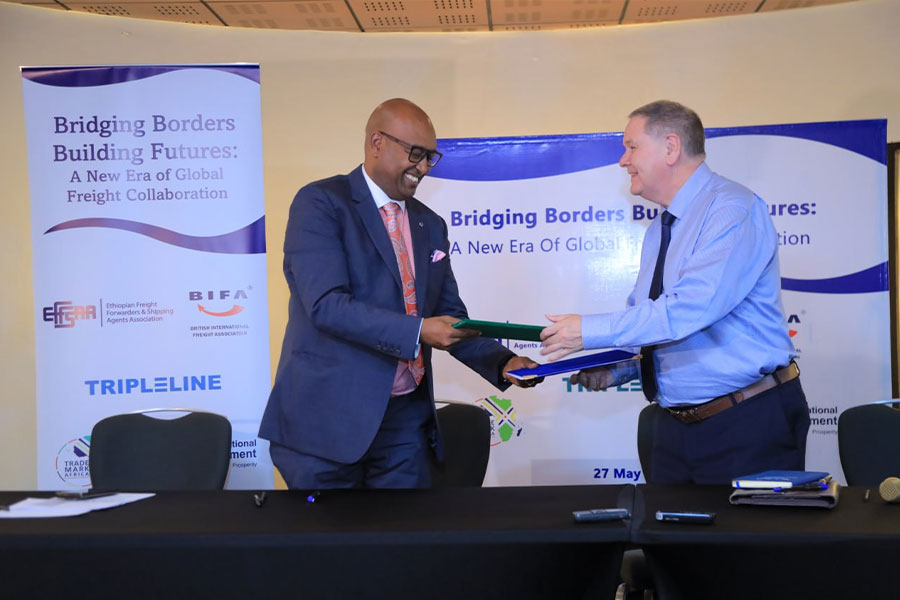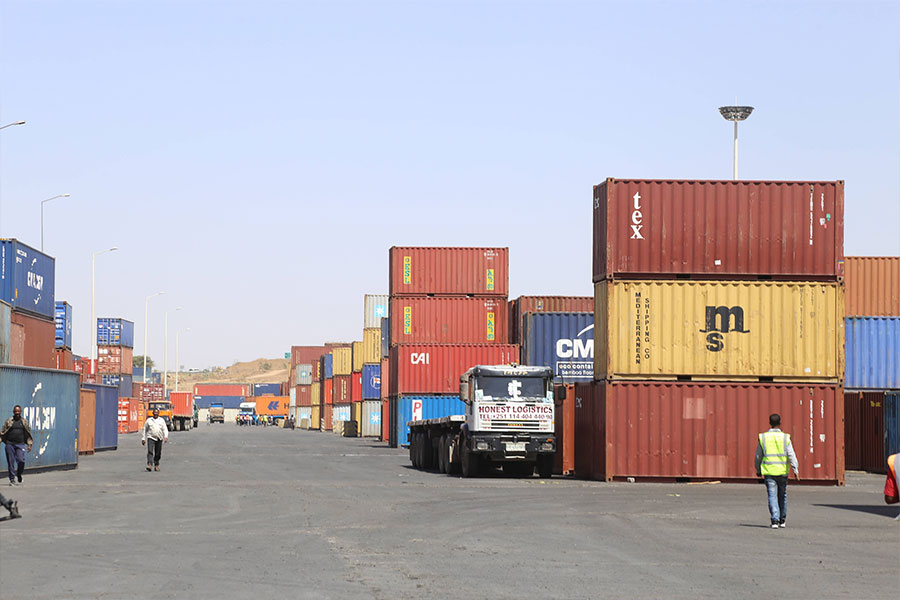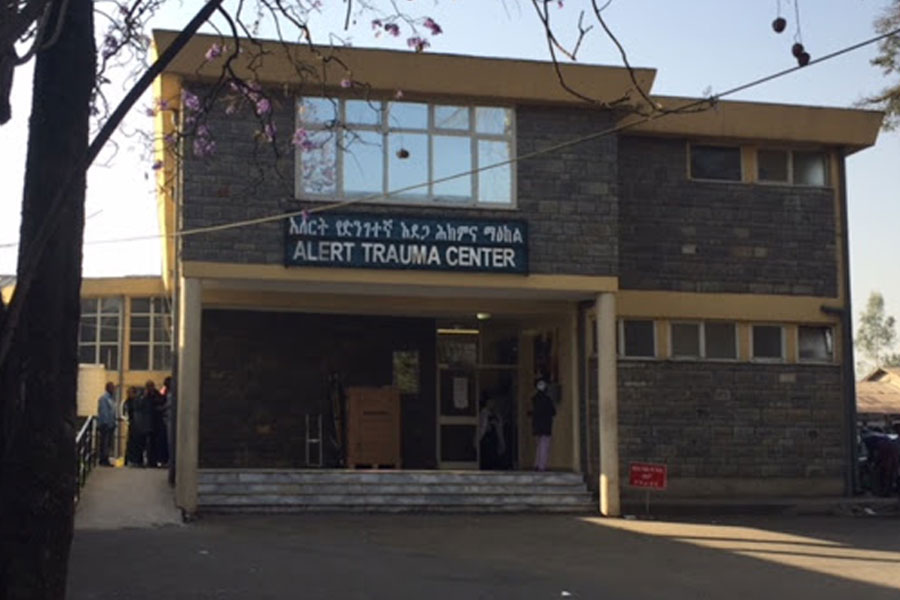
Radar | Jul 13,2019
The two-year-old Djibouti National Shipping Company has acquired its second container ship through an investment of seven million dollars.
The company, which was formed under the Djibouti Ports & Free Zone Authority (DPFZA) with seven million dollars in capital, acquired the vessel from Greece. Named African Sun, the 14-year-old vessel has the capacity to transport 1,118 containers. African Sun will be the company's second vessel, which previously procured an oil tanker.
The vessel, which used to be called Asian Sun, was sailing under the flag of Cyprus, an island in the eastern Mediterranean. Built by the Chinese company Jiangdong Shipyard, the vessel's draught (the vertical length between the waterline and the bottom of the hull) is 6.5m. Its length and width are 147.9m and 23.4m, respectively.
"We have planned to be a transshipment hub for the whole region," said Aboubaker O. Hadi, chairperson of Djibouti Ports & Free Zone Authority, which manages the Port of Djibouti and oversees the management of the Djibouti International Free Trade Zone. "We would like to play a complementary role with the Ethiopian Shipping & Logistics Services Enterprise."
As a state monopoly, the Enterprise is the major transporter of Ethiopia's import and export commodities, controlling 80pc of the market. It exclusively transports wheat, fertiliser and sugar, as well as a significant amount of imported rebar and coal. Last year, the Enterprise carried 108,000 containers during the first half of this fiscal year.
For almost two decades around 97pc of Ethiopia’s import-export cargo has been ferried through Djibouti's ports, while two percent and one percent are shipped through Port Sudan and Berbera, respectively. Currently, Ethiopia ships between 60,000 to 70,000 containers, or twenty-foot equivalent units (TEU), a year.
Djibouti's Shipping Company, which is under the stewardship of Aden Moussa Dulleh and employs 50 people, intends to provide a container shuttle service between ports, including Jebel Ali (Dubai), Jeddah, Berbera, Bossaso and other regional destinations. It aims to provide a transport service in the region and the Indian ocean. The managers also hope to take a share from the 50pc of containers destined for Sudan and Jeddah through Djibouti.
Roba Megerssa, CEO of Ethiopia's Shipping Enterprise, which carries 17,000 containers a month, also says the company will not be a threat to the Enterprise's business.
"I believe our business model is different from theirs," he told Fortune. "Their service is a feeder for regional connectivity."
The Enterprise operates 11 vessels and two leased oil tankers. It carries 20pc of the country's import and export commodities using its own vessels. To ship the remaining, it uses vessels through a slot charter and slot leasing arrangement. It works with Maersk Line, MSC, and CMA CGM S.A. among others container shipping companies. It ferries to 327 seaports across the globe.
Recently, the Enterprise announced a plan to procure two mid-sized vessels dedicated to dry bulk cargo. The Enterprise hopes the procurement of the vessels will be made in the next fiscal year.
Tesfaye Belay, a lecturer at Addis Abeba University specialising in procurement, logistics and supply chain management, says that the vessel will mainly serve as a feeder, since it has a smaller loading capacity.
"It can play a role in delivering containers from mother ships to the regional ports where big ships wouldn't go," he said.
Sudan, Mombassa and Yemen ports could be the potential destinations of the vessel in a transshipment model, according to Tesfaye.
He also says that operating the vessel can be a good opportunity for the Djiboutian company to get to know the shipping business.
"If the company develops its capacity and offers reasonable prices," said Tesfaye, "it can be a competitive shipping company in the region."
Ethiopia could also benefit from Djibouti's shipping company by sending trained mariners, according to him.
"Since the country has a couple of marine training institutions," said Tesfaye, "the company can hire professionals that are trained by these institutes."
The Ethiopian Maritime Training Institute, a private company working in collaboration with Bahir Dar University and Babogaya Maritime & Logistics Training Academy, which is the Ethiopian Shipping & Logistics Services Enterprise training centre, are the two major marine training institutes operating in the country.
PUBLISHED ON
Mar 14,2020 [ VOL
20 , NO
1037]

Radar | Jul 13,2019

Fortune News | Jan 30,2021

Radar | Oct 17,2022

Radar | Aug 06,2022

Exclusive Interviews | Jan 05,2020

Radar | May 31,2025

Commentaries | Jan 31,2021

Fortune News | Aug 28,2021

Fortune News | Jun 19,2021

Radar | May 25,2019

Dec 22 , 2024 . By TIZITA SHEWAFERAW
Charged with transforming colossal state-owned enterprises into modern and competitiv...

Aug 18 , 2024 . By AKSAH ITALO
Although predictable Yonas Zerihun's job in the ride-hailing service is not immune to...

Jul 28 , 2024 . By TIZITA SHEWAFERAW
Unhabitual, perhaps too many, Samuel Gebreyohannes, 38, used to occasionally enjoy a couple of beers at breakfast. However, he recently swit...

Jul 13 , 2024 . By AKSAH ITALO
Investors who rely on tractors, trucks, and field vehicles for commuting, transporting commodities, and f...

Oct 25 , 2025
The regulatory machinery is on overdrive. In only two years, no fewer than 35 new pro...

Oct 18 , 2025
The political establishment, notably the ruling party and its top brass, has become p...

Oct 11 , 2025
Ladislas Farago, a roving Associated Press (AP) correspondent, arrived in Ethiopia in...

Oct 4 , 2025
Eyob Tekalegn (PhD) had been in the Governor's chair for only weeks when, on Septembe...